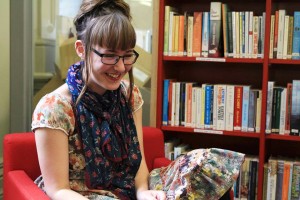the bookshelf diaries: kat muscat
The Bookshelf Diaries takes a peek into the reading life of writers, readers and book lovers. Today, self-confessed ‘big nerd’ Kat Muscat reveals her favourite avenues of online reading.
What are you reading right now?
Thug Kitchen. It’s truly a fantastic life resource.
Beyond that, I’ve been re-reading ‘C-can we rest now: Foucault and the Multiple Discursive Subjectivities of Spike’. No, hear me out! It’s not just Buffy the Vampire Slayer fandom taken too far (though there is a bit of that, probably). I’m writing an article about representations of rapists—in this case, an attempted rapist—in the media. This article, while academic as all hell(mouth), also argues something I strongly believe. Specifically, that categorising rapists as monsters is regressive and dangerous. Also ironic in this case, as Spike is literally a monster.
Where did you buy it?
I… did not. It’s from the archive of Slayage: The Journal of Whedon Studies Association where I spend too much time. Especially considering Whedon has endorsed ‘genderist’ as preferable to feminist. That’s messed up.
Also just finished the first issue of Archer, a magazine based in Melbourne that opens a wonderful dialogue about sexual and gender diversity. Highly recommended. The second issue has just been launched, and you can buy both on the website.
What’s in your to-read pile?
A fully separate Chrome window with tabs of links shared by friends—most of them about feminism (surprising no-one). Once a month in Melbourne there is a fantastic feminist salon called Cherchez la Femme, which is one of my favourite things ever. It also recently introduced me to disability feminism and politics. This is a massive blindspot in my practise currently. Some recommendations that came out of that session have thankfully been recorded on the podcast.
I’m also tempted to steal from the to-read list outlined here, which has been doing the rounds lately. And it’s worth mentioning a rad response written by Pamela Clark, ‘35 Practical Tools for Men to Further the Feminist Revolution’ that is exactly the resource you want it to be.
What’s the best book you’ve read in the past year?
Again, not a book—I really don’t read many books anymore, all depressing nonfiction articles, all the time. My honest answer would have to be WE NEED TO CHANGE THE WAY WE TALK ABOUT RAPE by Hulk. The whole thing is in all caps. It’s also written by a guy, so the first time I read it I was extremely critical—just waiting for this dude to trip up at some point. Especially since it’s a long and he makes a great number of points. However, I can’t really fault it; the article crystalises exactly how, and with the appropriate amount of anger and pathos, exactly how we’re doing everything wrong as a society when it comes to dealing with sexual assault.
Where do you like to read?
Online is becoming a clear theme.
What’s your favourite book of all time?
Sorry to name two white guys (one dead, the other still kicking so far as I know). But the two that caught me in those formative years are Orwell’s ‘Nineteen Eight-Four’ and ‘The Princess Bride’ by William Golding. The first is resilient in its re-readability, and how inescapable the conclusion is, within the constraints of the text. ‘The Princess Brides’ toys with form, cliché and character in a joyful way people tend to forget is an option.
Oh, also ‘Feminism is for Everybody’ by bell hooks. I think that’s everyone’s favourite though.
What do you read to feel inspired?
At the moment I’m more geared towards the discussions that happens when you discover (then inevitably share) a particularly good article. Or alternatively, the raging evoked when hate-reading—this is best done selectively. The echo chamber is a real thing, but one I try to make work to my advantage. It’s impossible to be intersectional in a vacuum. Dialogue over the nuances of a contention, or collectively breaking down why an argument does or doesn’t hold water is very important. And often what sparks new thoughts or allow you to look at things with a different perspective.
Kat Muscat is an editor, writer, and feminist based in Melbourne. She writes primarily about sex, sexuality, feminism, and mental health. Kat is currently editing Dialect, a multilingual anthology featuring writers from refugee or migrant backgrounds.


